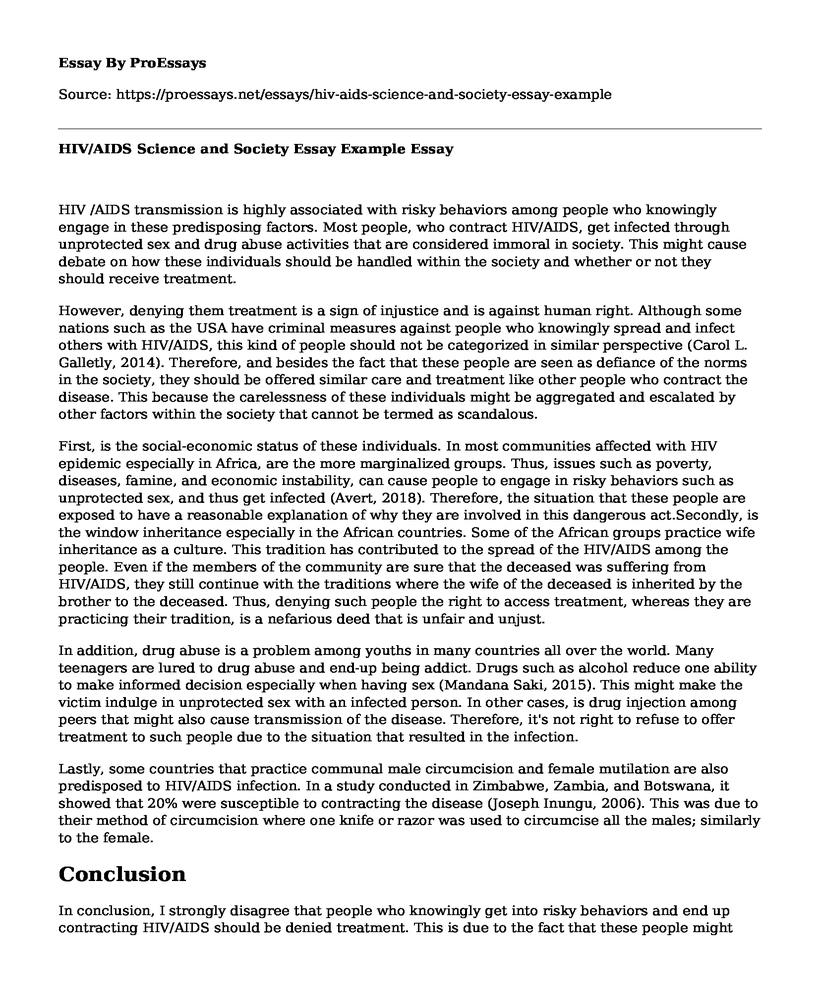HIV /AIDS transmission is highly associated with risky behaviors among people who knowingly engage in these predisposing factors. Most people, who contract HIV/AIDS, get infected through unprotected sex and drug abuse activities that are considered immoral in society. This might cause debate on how these individuals should be handled within the society and whether or not they should receive treatment.
However, denying them treatment is a sign of injustice and is against human right. Although some nations such as the USA have criminal measures against people who knowingly spread and infect others with HIV/AIDS, this kind of people should not be categorized in similar perspective (Carol L. Galletly, 2014). Therefore, and besides the fact that these people are seen as defiance of the norms in the society, they should be offered similar care and treatment like other people who contract the disease. This because the carelessness of these individuals might be aggregated and escalated by other factors within the society that cannot be termed as scandalous.
First, is the social-economic status of these individuals. In most communities affected with HIV epidemic especially in Africa, are the more marginalized groups. Thus, issues such as poverty, diseases, famine, and economic instability, can cause people to engage in risky behaviors such as unprotected sex, and thus get infected (Avert, 2018). Therefore, the situation that these people are exposed to have a reasonable explanation of why they are involved in this dangerous act.Secondly, is the window inheritance especially in the African countries. Some of the African groups practice wife inheritance as a culture. This tradition has contributed to the spread of the HIV/AIDS among the people. Even if the members of the community are sure that the deceased was suffering from HIV/AIDS, they still continue with the traditions where the wife of the deceased is inherited by the brother to the deceased. Thus, denying such people the right to access treatment, whereas they are practicing their tradition, is a nefarious deed that is unfair and unjust.
In addition, drug abuse is a problem among youths in many countries all over the world. Many teenagers are lured to drug abuse and end-up being addict. Drugs such as alcohol reduce one ability to make informed decision especially when having sex (Mandana Saki, 2015). This might make the victim indulge in unprotected sex with an infected person. In other cases, is drug injection among peers that might also cause transmission of the disease. Therefore, it's not right to refuse to offer treatment to such people due to the situation that resulted in the infection.
Lastly, some countries that practice communal male circumcision and female mutilation are also predisposed to HIV/AIDS infection. In a study conducted in Zimbabwe, Zambia, and Botswana, it showed that 20% were susceptible to contracting the disease (Joseph Inungu, 2006). This was due to their method of circumcision where one knife or razor was used to circumcise all the males; similarly to the female.
Conclusion
In conclusion, I strongly disagree that people who knowingly get into risky behaviors and end up contracting HIV/AIDS should be denied treatment. This is due to the fact that these people might have few alternatives, especially when it comes to culture and economic instability or are involved in other practices that indirectly lead to the infection such as drug abuse.
References
Avert. (2018, August 9). Sex workers, HIV and AIDS. Retrieved from https://www.avert.org/professionals/hiv-social-issues/key-affected-populations/sex-workers
Carol L. Galletly. (2014, October 1). Charges for Criminal Exposure to HIV and Aggravated Prostitution Filed in the Nashville, Tennessee Prosecutorial Region 2000-2010. Retrieved from https://www.ncbi.nlm.nih.gov/pmc/articles/PMC4060526/
Joseph Inungu. (2006). Understanding the Scourge of HIV/AIDS in Sub-Saharan Africa. Retrieved from https://www.ncbi.nlm.nih.gov/pmc/articles/PMC2765908/
Mandana Saki. (2015). Perception of Patients With HIV/AIDS From Stigma and Discrimination. Retrieved from https://www.ncbi.nlm.nih.gov/pmc/articles/PMC4537784/
Cite this page
HIV/AIDS Science and Society Essay Example. (2022, Nov 20). Retrieved from https://proessays.net/essays/hiv-aids-science-and-society-essay-example
If you are the original author of this essay and no longer wish to have it published on the ProEssays website, please click below to request its removal:
- Food Security Theories
- Design on Educational Handout on Urinary Tract Infections in The Elderly Essay
- The Future of Nursing: Leading Change, Advancing Health Essay
- The Influence of Antidiabetic Medications on the Development and Progression of Prostate Cancer
- Huntington Disease - Essay Sample
- COVID-19: Global Outbreak From China to Antarctica - Essay Sample
- Rise in Diseases: A Call for Improved Healthcare Facilities - Essay Sample







